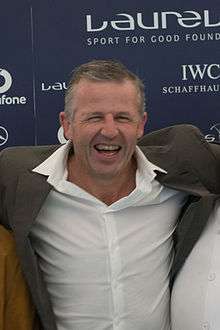Sean Fitzpatrick
Sean Brian Thomas Fitzpatrick ONZM (born 4 June 1963 in Auckland),[1] is a former rugby union player who represented New Zealand, and is widely regarded as one of the finest players ever to come from that country. He is also the son of former player Brian Fitzpatrick.
 Sean Fitzpatrick at the 2008 Laureus Day in London | |||||||||||||||||||||||||||||||||||||||||||||
| Birth name | Sean Brian Thomas Fitzpatrick | ||||||||||||||||||||||||||||||||||||||||||||
|---|---|---|---|---|---|---|---|---|---|---|---|---|---|---|---|---|---|---|---|---|---|---|---|---|---|---|---|---|---|---|---|---|---|---|---|---|---|---|---|---|---|---|---|---|---|
| Date of birth | 4 June 1963 | ||||||||||||||||||||||||||||||||||||||||||||
| Place of birth | Auckland, New Zealand | ||||||||||||||||||||||||||||||||||||||||||||
| Height | 1.83 m (6 ft 0 in) | ||||||||||||||||||||||||||||||||||||||||||||
| Weight | 105 kg (16 st 7 lb) | ||||||||||||||||||||||||||||||||||||||||||||
| School | Sacred Heart College | ||||||||||||||||||||||||||||||||||||||||||||
| Notable relative(s) | Brian Fitzpatrick (father) Rosanne Meo (aunt) | ||||||||||||||||||||||||||||||||||||||||||||
| Rugby union career | |||||||||||||||||||||||||||||||||||||||||||||
| |||||||||||||||||||||||||||||||||||||||||||||
Early life
Fitzpatrick's high school education was at Sacred Heart College, Auckland. As a primary school student he attended at Mt Carmel Primary (Auckland).
Early rugby career
A product of the powerful Auckland provincial side, Fitzpatrick made his international debut as one of the "Baby Blacks" in the 1986 Test series in France. Although most of the regular starting fifteen for New Zealand had been suspended following the unauthorised "Cavaliers" tour of South Africa, the All Blacks won, and a number of new faces made their mark on the selectors. Despite this start, Fitzpatrick still went into the inaugural Rugby World Cup as second choice to captain Andy Dalton. However, Dalton had to withdraw from the early stages of the tournament due to injury, and although he recovered in time for the finals, Fitzpatrick kept his place in the team, leaving scrum-half David Kirk to skipper the side to victory against France in the final at Eden Park in Auckland.
Captain of the All Blacks
In 1992 Fitzpatrick was awarded the captaincy of the All Blacks, a position he held until his retirement from test rugby. A first test match win against the Springboks since their return from isolation, plus series victories over a World XV and Ireland were dampened by the loss of the Bledisloe Cup in Australia.
The biggest event of the rugby calendar in 1993 was the British Lions tour to New Zealand. The first test went narrowly to the All Blacks, with Grant Fox kicking a last minute 50-metre penalty to steal a win. This was avenged in the Second Test by the Lions with their highest-scoring Test win in New Zealand. In the third test, with Fitzpatrick faced the prospect of becoming only the second ever All Blacks captain to lead his team to a series defeat against the Lions. The side were 10–0 down at one point, but recovered to take the match convincingly and with it the series.
Unwanted history could not be avoided on the end of season tour to Britain however, as England picked up a win over New Zealand at Twickenham. 1994 was another up and down season for the All Blacks. South Africa were defeated 2–0 with one game drawn. However, France caused a major upset by winning their series in New Zealand 2–0, the first and only European team so far to achieve this.
By the time of the 1995 World Cup New Zealand had assembled a more formidable side. Ian Jones, Jeff Wilson, Andrew Mehrtens, Zinzan Brooke and Jonah Lomu had proved themselves as world-class players. New Zealand were most pundit's pre-tournament favourites. The All Blacks had convincingly defeated all opponents, the most remarkable being a semi-final against England, in which Lomu scored four tries. They met the hosts, South Africa in the final, who had stuttered through the early stages. South Africa won the tournament in extra time with a Joel Stransky drop goal. After storming through the first Tri Nations Series unbeaten, the All Blacks embarked upon a further three-match series in South Africa. The 1996 tour of South Africa was the first series win by a New Zealand side in South Africa. The 1996 All Blacks were one of the great teams in the history of the game, and the series win cemented their captain's place among the true greats. Continued success with Auckland in the NPC and the Auckland Blues in the new Super 12 continued in the following seasons, but it was clear that Fitzpatrick's days in the game were numbered. He was carrying an injury in the autumn of 1997, yet such was his status that coach John Hart thought it would be good for the other players to include him in the party. He made his 92nd and final test appearance on 29 November 1997 as a substitute in the 42–7 victory against Wales at Wembley.
Legacy
Fitzpatrick was appointed an Officer of the New Zealand Order of Merit, for services to rugby, in the 1997 New Year Honours.[2] He remains an icon in New Zealand and is highly respected in South Africa. He was part of two of the finest frontrow combinations in rugby history, firstly with Steve McDowell and Richard Loe, and secondly with Craig Dowd and Olo Brown.
Honours
- Auckland
- National Provincial Championship 1987, 1988, 1989, 1990, 1993, 1994, 1995, 1996
- Ranfurly Shield 1995, 1996
- New Zealand
- World Cup 1987
- Bledisloe Cup 1987, 1988, 1989, 1990, 1991, 1993, 1995, 1996, 1997
- Tri Nations 1996, 1997
- British and Irish Lions Series Victory 1993
- International record for most consecutive test matches (63 successive Tests between 1986 & 1996.)[3]
- International team record for most consecutive tests without defeat (23 test matches between 1987 and 1990)[4]
References
- "Sean Fitzpatrick". scrum.com. Retrieved 9 May 2012.
- "New Year honours list 1997". Department of the Prime Minister and Cabinet. 31 December 1996. Retrieved 15 December 2019.
- http://www.espn.co.uk/blogs/sport/story/305199.html#vuvoauQwGR5cEyIv.99
- http://stats.espnscrum.com/scrum/rugby/records/team/most_consecutive_without_defeat.html?id=1;type=class
External links
| Sporting positions | ||
|---|---|---|
| Preceded by Gary Whetton |
All Blacks Captain 1992–1997 |
Succeeded by Justin Marshall (interim captain) Taine Randell (permanent appointment) |